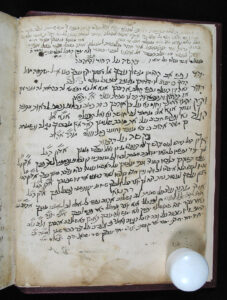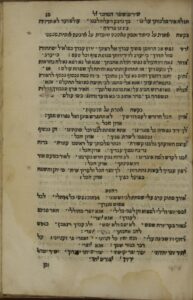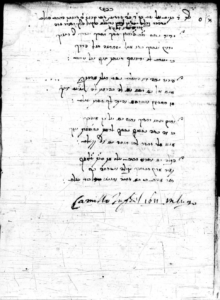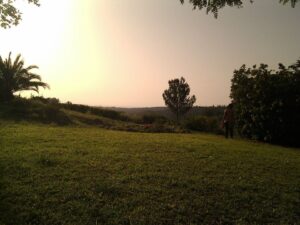| Source (Hebrew) | Translation (English) |
|---|---|
יְדִיד נֶפֶשׁ אָב הָרַחֲמָן מְשֺׁךְ עַבְדָּךְ אֶל רְצוֹנָךְ יָרוּץ עַבְדָּךְ כְּמוֹ אַיָּל יִשְׁתַּחֲוֶה מוּל הֲדָרָךְ כִּי יֶעֱרַב לוֹ יְדִידוּתָךְ מִנּפֶֺת צוּף וְכָל טַעַם |
Beloved of my soul, Merciful Father draw your servant after your will Your servant would run swift as a deer to kneel before Your splendor For Your love is sweeter to him than honey nectar and all pleasing savor |
הָדוּר נָאֶה זִיו הָעוֹלָם נַפְשִׁי חוֹלַת אַהֲבָתָךְ אָנָּא אֵל נָא רְפָא נָא לָהּ בְּהַרְאוֹת לָהּ נעַֺם זִיוָךְ אָז תִּתְחַזֵּק וְתִתְרַפֵּא וְהָיְתָה לָךְ שִׁפְחַת עוֹלָם |
Exalted Glorious Beautiful Light of the World my soul is love-sick for You Please, My God, please heal her by showing her the beauty of Your radiance Then she will be strengthened and healed and be Your maidservant forever |
וָתִיק יֶהֱמוּ רַחֲמֶיךָ וְחוּסָה נָא עַל בֶּן אוֹהֲבָךְ כִּי זֶה כַמֶּה נִכְסֺף נִכְסַף לִרְאוֹת בְּתִפְאֶרֶת עֻזָּךְ אָנָּא אֵלִי מַחְמַד לִבִּי חוּשָׁה נָּא וְאַל תִּתְעַלָּם |
Ancient One arouse Your mercy spare the son of Your beloved friend For he has a long time longed to behold the magnificence Your might Please, My God, My Heart’s Delight, oh come quickly do not forsake me |
הִגָּלֶה נָא וּפְרֺשׂ חָבִיב עָלַי אֶת סֻכַּת שְׁלוֹמָךְ תָּאִיר אֶרֶץ מִכְּבוֹדָךְ נָגִילָה וְנִשְׂמְחָה בָךְ מַהֵר אָהוּב כִּי בָא מוֹעֵד וְחָנֵּנִי כִּימֵי עוֹלָם |
Reveal Yourself my dearest and spread over me Your canopy of peace Let the earth be illuminated with Your glory let us be delighted and rejoice in You Make haste my beloved for the time has come show me Your favor as in the days of old |
“Yedid Nefesh” is a piyyut first published in the Sefer Haḥaredim (1588) of Rabbi Elazar Moshe Azikri (1533-1600). The authorship of the piyyut is not completely certain. A version of the piyyut “with noteworthy text, spelling and pointing” may be found on folio 146 (verso) of Samuel b. David b. Solomon’s Commentary On the Book of Numbers (ca. 1437 CE).[1] Find Stefan C. Reif’s The Hebrew Manuscripts at Cambridge University Libraries: A Description and Introduction Cambridge: Cambridge University Press, 1997, page 93. Reif attributes Yedid Nefesh to Azkiri. Presumably, the text must have been added to the 15th century manuscript sometime after the publication of Sefer Haḥaredim. It would be very nice to see a digitized image of this manuscript page from the CUL collection! Yedid Nefesh also appears in Moscow – Russian State Library, Ms. Guenzburg 320 as the last of “a polyglot of at least 24 different items written in different stages” (find Dr. Ezra Chwat, גילוי מילתא בעלמא Giluy Milta B’alma). Yedid Nefesh appears there under the following headline: ד’ בתים של שם בן ד’ ב”ה ששמענו מפי קדוש מכבוד החכם השלם מהר”ר גדליה בן לגאון המושלם המקובל [הא]לקי כמהר”ר משה קורדוברו זצק”ל”. Ezra Chwat: “This doesn’t necessarily qualify that Gedalia Cordovero (1562–1625, son of Moshe Cordovero, ReMaK), is the author. To be precise, it attributes to him the oral transmission.” Meir Benayahu in Yosef Behiri, 1991, p.544, “asserts that this witness must have heard the poem from Gedalia Cordevero after his descent [from Safed] to Italy in 1583. This would be a full five years before Ḥaredim was written (and 17 years before [it was] published). Having been transmitted orally for some time might explain some of the variants. In any case Gedalia Cordevero and Elazar Azkari are likely to have been well acquainted.” The piyyut has appeared with a number of variations in various siddurim.
The English translation was made by Sara-Kinneret Lapidot as published in the Invitation to Piyut North America: 18 Piyutim & Mizmorim (2010), p.7. –Aharon Varady
Source(s)

Yedid Nefesh (JTSA MS3541, fol.5v) yedid nefesh – sefer haḥaredim 43a (Venice 1597)

Notes
| 1 | Find Stefan C. Reif’s The Hebrew Manuscripts at Cambridge University Libraries: A Description and Introduction Cambridge: Cambridge University Press, 1997, page 93. Reif attributes Yedid Nefesh to Azkiri. Presumably, the text must have been added to the 15th century manuscript sometime after the publication of Sefer Haḥaredim. It would be very nice to see a digitized image of this manuscript page from the CUL collection! |
|---|

“יְדִיד נֶפֶשׁ | Yedid Nefesh, a piyyut transmitted by Elazar ben Moshe Azikri (ca. 16th c.) translated by Sara Lapidot” is shared through the Open Siddur Project with a Creative Commons Attribution-ShareAlike 4.0 International copyleft license.











Leave a Reply